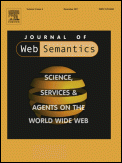
Journal of Web Semantics
Scope & Guideline
Elevating Academic Discourse in Web Semantics and Beyond.
Introduction
Aims and Scopes
- Knowledge Graph Construction and Utilization:
The journal emphasizes research on the creation, management, and application of knowledge graphs, exploring techniques for integrating heterogeneous data sources and enhancing data interoperability. - Semantic Data Management and Ontology Engineering:
A core focus is on ontology design, alignment, and management, examining how these can be effectively applied to facilitate semantic data access and enhance data representation. - Artificial Intelligence and Machine Learning Integration:
The journal explores the intersection of semantic web technologies with AI and ML, particularly in areas like explainable AI, accountability in machine learning, and the use of semantic embeddings. - Applications in Various Domains:
Research published in the journal often highlights the application of semantic technologies in diverse fields such as healthcare, cultural heritage, and social networks, demonstrating the broad impact of these technologies. - Interoperability and Standardization:
The journal discusses the importance of interoperability among different systems and data formats, advocating for standards that facilitate seamless interaction and data exchange.
Trending and Emerging
- Decentralized Semantic Technologies:
Recent publications have increasingly explored concepts related to decentralized systems, particularly in the context of blockchain and decentralized autonomous organizations (DAOs), highlighting the growing interest in how these technologies can enhance data sovereignty and trust. - Explainable AI and Accountability:
There is a rising trend towards research that seeks to make AI systems more transparent and accountable, particularly through the lens of knowledge graphs, reflecting the industry's demand for responsible AI practices. - Integration of Semantic Web and Machine Learning:
An emerging theme is the integration of semantic web technologies with machine learning techniques, focusing on how knowledge graphs can enhance ML models, particularly in areas such as zero-shot learning and knowledge graph embeddings. - Temporal and Spatial Data Interlinking:
Recent works emphasize the interlinking of temporal and spatial data within knowledge graphs, which is crucial for applications in geospatial analysis and dynamic data environments. - Health and Biomedical Applications:
There is a noticeable increase in research addressing semantic technologies in healthcare and biomedical fields, particularly in constructing knowledge graphs for health-related data and improving data interoperability.
Declining or Waning
- Traditional Semantic Web Applications:
There has been a noticeable reduction in publications focusing on traditional semantic web applications that do not leverage advanced technologies or innovative methodologies, indicating a shift towards more complex and integrated approaches. - Static Ontologies:
Research on static ontologies, which do not evolve or adapt over time, appears to be decreasing as the field moves towards dynamic and adaptable semantic frameworks that can better handle real-time data. - Basic Semantic Reasoning Techniques:
The focus on foundational reasoning techniques has diminished, with more emphasis now placed on advanced reasoning methods that incorporate machine learning and deep learning paradigms. - General Surveys on Semantic Technologies:
There seems to be a waning interest in generic surveys covering broad topics in semantic technologies, as researchers seek more specific studies that delve into niche areas or emerging trends. - Manual Data Annotation and Integration:
Research centered around manual processes for data annotation and integration is declining, reflecting a trend towards automated and scalable solutions that utilize AI and machine learning.
Similar Journals

Natural Language Semantics
Defining the Future of Linguistic MeaningNatural Language Semantics, published by Springer, is a premier journal that has established itself as an essential platform in the fields of linguistics and philosophy. Since its inception in 1992, the journal has dedicated itself to advancing the understanding of natural language meaning through rigorous research and innovative methodologies. With its impressive Q1 ranking in both Linguistics and Language and Philosophy as of 2023, and a notable Scopus ranking in the 85th percentile within the Arts and Humanities, this journal is at the forefront of scholarly discourse. Authors and researchers contribute high-impact, peer-reviewed articles that explore topics ranging from semantics, pragmatics, to the intersections of philosophy of language. Though not an open-access publication, it provides maximum accessibility through various distribution channels, ensuring widespread dissemination of knowledge. Researchers, professionals, and students will find Natural Language Semantics a critical resource that not only informs but also inspires future inquiry in the analysis of meaning.

Applied Ontology
Shaping Tomorrow's Technologies Through OntologyApplied Ontology is a leading academic journal published by IOS PRESS, dedicated to advancing the field of ontology and its applications in various disciplines, including computer science and linguistics. With an impressive Q1 ranking in both Computer Science (Miscellaneous) and Linguistics and Language as of 2023, this journal stands at the forefront of innovation and research excellence, achieving a remarkable 95th percentile ranking in Arts and Humanities. The journal, which spans converged years from 2005 to 2024, aims to provide a multidisciplinary platform that fosters scholarly communication and collaboration, making it an invaluable resource for researchers, professionals, and students alike. Although currently not an open-access journal, Applied Ontology is recognized for its high-quality, peer-reviewed content that explores the theoretical underpinnings and practical implications of ontological frameworks, thereby supporting significant advancements in semantic technologies. Positioned in Amsterdam, Netherlands, the journal serves a global audience, contributing to the ongoing dialogue around ontology and its critical role in shaping contemporary technology and communication.
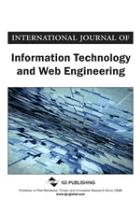
International Journal of Information Technology and Web Engineering
Innovating for Tomorrow's Digital ChallengesInternational Journal of Information Technology and Web Engineering, published by IGI GLOBAL, is a pivotal platform for the dissemination of cutting-edge research in the fields of information technology and web engineering. With its ISSN 1554-1045 and E-ISSN 1554-1053, this journal has been effectively contributing to the academic landscape since its inception in 2006, aiming to bridge theoretical frameworks and practical applications in an increasingly digital world. As a recognized Q3 journal in the realm of Computer Science (miscellaneous), it ranks 122 out of 232 in Scopus' classification, positioning it amidst the active discussions and developments within the IT and web engineering communities. The journal not only serves as an invaluable resource for researchers and educators but also encourages students and practitioners to explore innovative methodologies and technologies that shape the future of the digital landscape. Although it is not currently an open-access journal, its contributions are indispensable for advancing knowledge and fostering collaboration within the global research community.

Quaderns de Filologia-Estudis Linguistics
Innovative Research for the Linguistic Frontier.Quaderns de Filologia-Estudis Linguistics is a distinguished open-access journal published by the Universitat de València, Facultat de Filologia, specializing in the study of linguistics and language. With its ISSN 1135-416X and E-ISSN 2444-1449, this journal has been a valuable resource for scholars in the field since its transition to open access in 2012. Located in Valencia, Spain, it contributes significantly to the discourse within the Linguistics and Language category, currently holding a Q3 quartile ranking as per Scopus. The journal is dedicated to the dissemination of innovative research findings and theoretical discussions, ensuring that both emerging and established scholars have a platform for their work. Its inclusive scope and commitment to quality research help navigate the complex landscape of linguistic studies, making it an essential resource for researchers, professionals, and students alike. With converged years covering from 2019 to 2023, Quaderns de Filologia continues to foster a vibrant academic community, encouraging submissions that advance the field of linguistics.
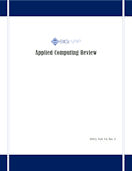
Applied Computing Review
Transforming Theory into Practice for Tomorrow's SolutionsApplied Computing Review is a prominent academic journal published by the Association for Computing Machinery (ACM), an esteemed organization known for advancing the computing profession. Focusing on the intersection of practical applications and theoretical foundations, this journal serves as a vital platform for disseminating research in the field of applied computing, facilitating knowledge sharing among researchers, professionals, and students alike. With an ISSN of 1559-6915, the journal encompasses a wide array of topics including software engineering, data analytics, and application development, addressing current trends and challenges in the industry. Although it does not offer open access, its rigorous peer-review process ensures high-quality publications that significantly contribute to the discipline. Positioned within a competitive landscape, Applied Computing Review is dedicated to fostering innovation and providing insightful perspectives that inspire further research, thereby solidifying its importance in the field of applied computing.

Informacao & Sociedade-Estudos
Connecting Local Perspectives to Global DiscussionsInformacao & Sociedade-Estudos, published by the Universidade Federal de Campina Grande, is a pivotal journal based in Brazil that focuses on the intersections of communication, sociology, and political science. With an ISSN of 0104-0146 and an E-ISSN of 1809-4783, it serves as a platform for scholarly discourse and research dissemination. Though it currently holds a Q4 ranking in both Communication and Sociology/Political Science, the journal facilitates essential conversations within these fields, particularly reflecting on regional studies and social dynamics in Latin America. Scholars can access this journal to explore diverse methodologies and perspectives, despite its discontinuation in Scopus coverage since 2023. The journal is dedicated to enhancing academic dialogue and providing insights that resonate with both local and global audiences. As research in these areas becomes increasingly crucial, Informacao & Sociedade-Estudos remains an important resource for academics and practitioners alike.

International Journal of Semantic Computing
Innovating Insights in Semantic ComputingThe International Journal of Semantic Computing is a premier scholarly publication focused on the intersection of artificial intelligence, computer networks, and linguistics, published by World Scientific Publishing Co PTE Ltd. Since its inception in 2007, this journal has strived to advance the field of semantic computing by promoting innovative research and interdisciplinary collaboration among professionals and academics. With a diverse scope that spans across various categories including Artificial Intelligence, Information Systems, and Linguistics, it boasts commendable rankings, particularly in the fields of Linguistics (77th Percentile) and Linguistics and Language (Rank #259/1167). The journal caters to a broad audience by offering critical insights and cutting-edge studies, thereby contributing significantly to knowledge enhancement in semantic technologies and computational linguistics. Although it does not offer open access options, its rigorous peer-review process ensures the publication of high-quality research that is invaluable for both researchers and students seeking to deepen their understanding in these rapidly evolving areas.
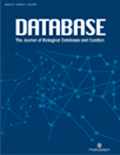
Database-The Journal of Biological Databases and Curation
Pioneering the Future of Biological Database ResearchDatabase - The Journal of Biological Databases and Curation, published by Oxford University Press, stands at the forefront of the rapidly evolving fields of biological data management and curation. Since its inception in 2009, this open access journal has become a pivotal resource for researchers and professionals eager to explore the intricate world of biological databases. With an impressive impact factor, it ranks in the Q1 quartile across significant disciplines such as Agricultural and Biological Sciences, Biochemistry, Genetics and Molecular Biology, Information Systems, and Medicine as of 2023. This prestigious standing reflects its commitment to high-quality research and innovation. The journal not only provides a platform for original research articles, reviews, and case studies but also aims to facilitate discussion on best practices in database design and curation. By bridging the gap between data generation and utilization, it plays an essential role in enhancing the accessibility and usability of biological data, making it indispensable for scholars and students who are navigating these complex domains.
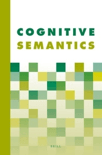
Cognitive Semantics
Decoding Language Through Cognitive LensesCognitive Semantics, published by BRILL, is a leading academic journal dedicated to the intricate study of cognitive processes underlying language use and semantic meaning. With its ISSN 2352-6408 and E-ISSN 2352-6416, this journal contributes significantly to the fields of linguistics and language studies, reflecting its importance in contemporary research on cognitive linguistics. Over its publication span from 2015 to 2024, it has established a niche as a Q3 ranked journal in the Linguistics and Language category for 2023, showcasing its relevance and growing influence in the academic community. Although currently not open access, the journal aims to provide a robust platform for exchanging ideas, theories, and methodologies related to cognitive semantics, fostering interdisciplinary dialogue among researchers, professionals, and students. Readers can expect to uncover valuable insights into the cognitive mechanisms that shape our understanding of language, making this journal an essential resource for anyone involved in linguistic research.
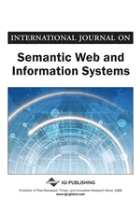
International Journal on Semantic Web and Information Systems
Unveiling Cutting-Edge Insights in Semantic Web Technologies.International Journal on Semantic Web and Information Systems, published by IGI Global, stands as a premier outlet for research in the realm of Semantic Web technologies and information systems. With a commitment to advancing knowledge and innovation, the journal is recognized for its influential contributions, evident from its prestigious Q1 rankings in both Computer Networks and Communications and Information Systems categories as of 2023. Catering to the high demands of the academic community, the journal provides a platform for interdisciplinary dialogue, showcasing cutting-edge research, methodologies, and applications that underpin the evolving landscape of information systems. Researchers and professionals can stay informed about the latest trends, best practices, and transformative technologies shaping the Semantic Web. Although it does not offer open access, the journal maintains rigorous peer-review standards to ensure quality and relevance, making it an essential resource for anyone dedicated to pushing the boundaries of knowledge in this dynamic field.